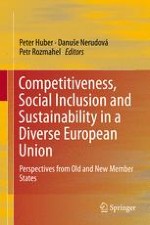2016 | OriginalPaper | Chapter
Sustainable Development in the EU
Authors : David Hampel, Ladislava Issever Grochová, Jitka Janová, Ladislav Kabát, Luboš Střelec
Published in: Competitiveness, Social Inclusion and Sustainability in a Diverse European Union
Publisher: Springer International Publishing
Activate our intelligent search to find suitable subject content or patents.
Select sections of text to find matching patents with Artificial Intelligence. powered by
Select sections of text to find additional relevant content using AI-assisted search. powered by
